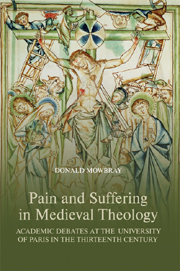 Pain and Suffering in Medieval Theology
Pain and Suffering in Medieval Theology Book contents
- Frontmatter
- Contents
- Acknowledgements
- Abbreviations
- Dedication
- Introduction
- 1 Thirteenth-Century Theological Ideas about Human Pain and Suffering and the Passion of Christ
- 2 Gendering Pain: Theological Ideas about Female and Male Suffering
- 3 Pain as a Restorative Power: Voluntary Suffering and Satisfaction for Sin
- 4 The Intellectual Development of Limbo: Pain, Children and Original Sin
- 5 Anima Separata: Masters of Theology and the Controversy surrounding the Suffering of the Separated Soul
- 6 Defining the Corporeal: Suffering in Hell according to Masters of Theology at Paris, c.1230–c.1280
- Conclusion
- Select Bibliography
- Index
- Frontmatter
- Contents
- Acknowledgements
- Abbreviations
- Dedication
- Introduction
- 1 Thirteenth-Century Theological Ideas about Human Pain and Suffering and the Passion of Christ
- 2 Gendering Pain: Theological Ideas about Female and Male Suffering
- 3 Pain as a Restorative Power: Voluntary Suffering and Satisfaction for Sin
- 4 The Intellectual Development of Limbo: Pain, Children and Original Sin
- 5 Anima Separata: Masters of Theology and the Controversy surrounding the Suffering of the Separated Soul
- 6 Defining the Corporeal: Suffering in Hell according to Masters of Theology at Paris, c.1230–c.1280
- Conclusion
- Select Bibliography
- Index
Summary
Suffering is essential to all life and is increased by every increase of knowledge.
bertrand russell's paraphrase of the theory of the cosmic will advanced by Schopenhauer is a reminder that pain and suffering are not only fundamental to humanity, but also to its knowledge and understanding. Describing and understanding pain and suffering has influenced many areas of modern research from philosophy and theology to medicine and analgesics and as a subject for philosophical and phenomenological investigation, pain has produced many interesting modern studies which have focused specifically on its inexpressibility and concentrated on the breakdown of language when it is described as a personal experience. There have also been numerous valuable contributions demonstrating the importance that ideas about pain and suffering hold for the historical understanding of theological development, but these have either fallen within the realms of biblical scholarship and biblical notions of suffering, or within research on modern theology which has recently been especially concerned with the impassibility of God. With so many studies in a multiplicity of disciplines, it is clearly widely accepted that the study of pain is important as a method for observing shifts in ideas and sentiments in many historical contexts. However, there has been no detailed, systematic historical work examining attitudes to pain and suffering for the medieval period, nor indeed many in-depth studies of particular common areas of analysis in the Middle Ages.
- Type
- Chapter
- Information
- Pain and Suffering in Medieval TheologyAcademic Debates at the University of Paris in the Thirteenth Century, pp. 1 - 12Publisher: Boydell & BrewerPrint publication year: 2009


